Electric Vehicle Sales Stuck in the Slow Lane
Air Date: Week of April 29, 2022
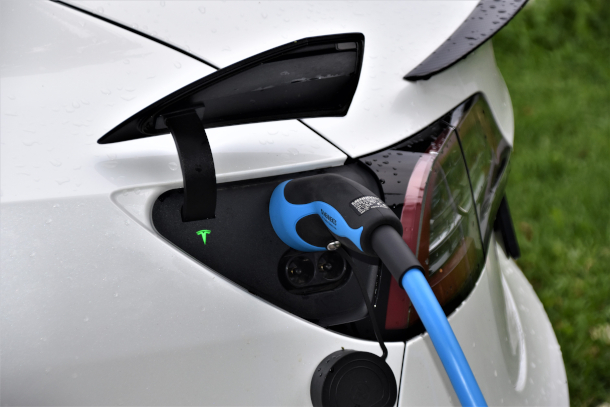
The Biden administration aims for electric vehicles to make up half of all new vehicles sold by 2030. In 2021, just 6 percent of vehicles sold in the U.S. were electric. (Photo: Waldemar Brandt on Unsplash)
Electric vehicles are key to decarbonizing the transportation sector, but most cars sold in the U.S. are still gas-powered. Even in Massachusetts, where a climate law requires net zero emissions by 2050, EV numbers are nowhere near where they need to be. Boston Globe Reporter Sabrina Shankman joins Host Bobby Bascomb to talk about what’s keeping electric vehicles in the slow lane and how to speed the transition.
Transcript
DOERING: It’s Living on Earth, I’m Jenni Doering
BASCOMB: And I’m Bobby Bascomb
Switching from gas-powered cars to clean electric vehicles is a key part of the Biden administration’s plans for the U.S. to reach net-zero emissions by 2050. That’s the target the United Nations says gives us a shot at keeping temperature rise below 1.5 degrees Celsius. But that transition is so far stuck in the slow lane. Electric vehicles made up just 6 percent of all vehicles sold in 2021. That’s an increase from 4 percent in 2020 but still far from President Biden’s goal that electric cars make up half of all new vehicles by 2030. Some states are much farther ahead than others, and California is the leader by far, with 40% of the EVs in the country. The state recently surpassed 1 million electric vehicles sold. But even in Massachusetts, where a legally binding climate law requires net zero emissions in the state by 2050, EVs are nowhere near where they need to be. Reporter Sabrina Shankman covers the climate crisis for the Boston Globe and joins me now to discuss. Sabrina, welcome to Living on Earth!
SHANKMAN: Thanks for having me.
BASCOMB: So how many electric vehicles does Massachusetts have right now compared to what it needs to reach its climate goals?
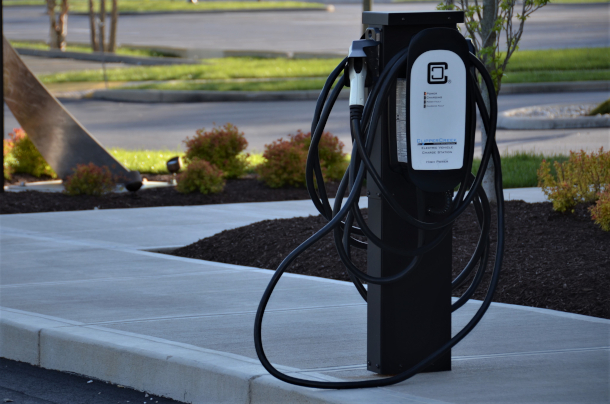
A lack of public chargers is hampering electric vehicle adoption across the U.S. (Photo: Roger Starnes Sr on Unsplash)
SHANKMAN: Yeah, so right now, or at least as of last month, Massachusetts had 51,431 electric vehicles on the road, but only about a little over 30,000 of those are actually fully electric, the rest are plug-in hybrids. By 2025, so right around the corner, the state is supposed to be at 300,000, according to some past goals. And by the end of the decade, right now, technically, there's a goal of 750,000, but that goal is most likely going to be revised to 1 million by 2030. So there's a lot of work to be done.
BASCOMB: Yeah, that's a huge gap, I mean, if you only have about 50,000 in the state right now, and you're looking at 300,000 in just a few years. Why is the state lagging so far behind in its EV goals?
SHANKMAN: Yeah. So my co reporter on this project, Taylor Dolven, and I looked into that, and found that there were several different reasons why this is such a dire situation. One is a money problem. You know, right now, electric vehicles cost more than their gas counterparts. And what all the experts we interviewed said is that until electric vehicles reach cost parity, are equal to the gas counterparts, you're not going to see enough people flooding into them. And so that's where rebates come in. There's a federal rebate, but that's sort of iffy and complicated, and then the states can come in with their own. But Massachusetts has never really found a stable and consistent funding source so that people could have faith in it. It actually had to shut down its program a couple years ago when it ran out of funds. So that's one side of it. There's also an issue with chargers, right, because if you're buying an EV, and you're going to jump in, you want to make sure that you can have the charging infrastructure in place so that you're not gonna get stuck somewhere. A lot of people can charge at home, but if you live in an apartment, it's more complicated. So you need to make sure there's the infrastructure out on the road. And there, you know, the state is really behind, too. I mean, there are now just under 5,000 public chargers in the state. But to get to the 2025 goal of 300,000 electric vehicles on the road, National Grid did some work and found that we needed roughly 21,000 chargers.
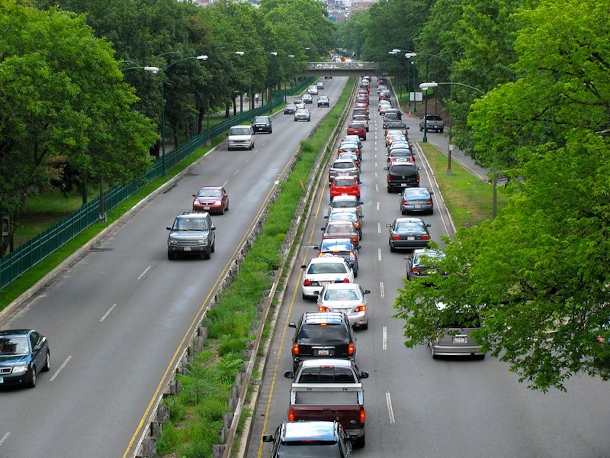
Traffic along Storrow Drive in Boston, Massachusetts. Until electric vehicles achieve cost parity with gas powered cars, experts say, rebates are needed to encourage consumers to shift to EVs. (Photo: Second Light Photography, Flickr, CC BY-NC-ND 2.0)
BASCOMB: Yeah, that's a big difference. Yeah.
SHANKMAN: Right? And then on top of all this is the added complication of the moment that we're in right now with COVID, because we have a major supply chain problem. So I have talked to people, and especially since our story ran, heard from tons of people who are like, I want an EV. I would love to have an EV! But I can't find one. Or if I do find them, the prices have been, you know, jacked up so high that they're just totally out of reach.
BASCOMB: And, of course, I'm sure Massachusetts is not alone in this set of problems that you just outlined. But are there any states that are doing this well, and that are actually making progress on their EV goals?
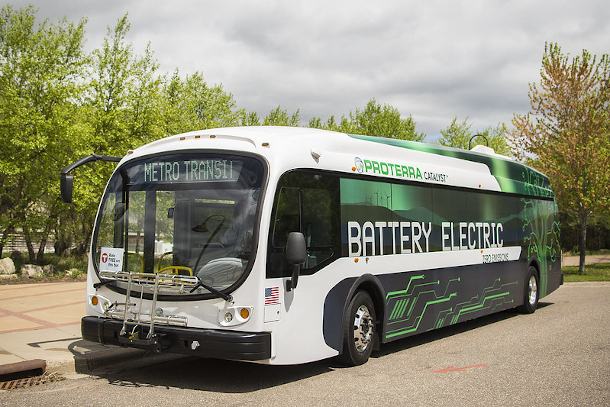
Electric vehicles are key, but clean public transit and safe biking infrastructure are equally critical to reducing carbon emissions from the transportation sector. (Photo: Eric Wheeler, Metro Transit, Flickr, CC BY-NC-ND 2.0)
SHANKMAN: Yeah, there's a lot. I mean, California is always the gold standard when you're talking about electric vehicles. And they've had a series of measures that have helped folks get into EVs and have helped speed up the rate of public charging infrastructure. Oregon is another one that has a really high rate of electric vehicle ownership. And they're, you know, they have a couple of things that Massachusetts doesn't have, in particular, larger rebates for low and moderate income residents. If you're a low and moderate income resident, you can get a rebate up to $7,500 in Oregon. In Massachusetts, if you're buying an electric vehicle, and it's under $50,000, then you can qualify for a rebate, it's going to be $2,500 for basically everybody. So that is considered to be one of the big things that a state can do to help drive ownership. Because we don't just want wealthy folks driving Teslas, we need everybody to get on board. I would be remiss if I didn't also add that a huge part of reaching our climate goals is also just getting fewer people to drive. That's a major part. If everybody just switches over from gas vehicles to EVs, we haven't really solved the problem. We also have to electrify transit, get better bike lanes, get people on bikes on E-bikes. But there will still be a lot of drivers. And so for that it has to be equitable. And we have to find a way to get lower and moderate income people, you know, make it in reach for them as well.
BASCOMB: Well, on a federal level, the $1 trillion infrastructure bill that was signed into law last year included roughly seven and a half billion dollars for electric vehicle infrastructure. I know it's only been a few months here, but how might that money helped to encourage electric vehicle sales on the state level? And are you actually seeing any changes yet?
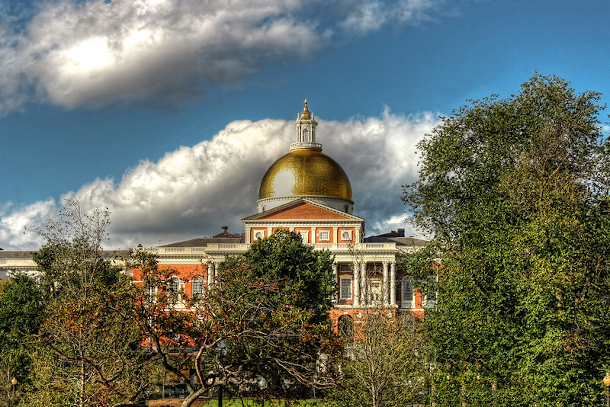
The Massachusetts State House as seen from Boston Common. In 2021 the Massachusetts Legislature passed, and Governor Charlie Baker signed into law a legally binding climate goal of 50% emissions reductions by 2030 and net zero by 2050. (Photo: Daniel Mennerich, Flickr, CC BY-NC-ND 2.0)
SHANKMAN: So we're not seeing any changes yet, but the state is still working on plans that would direct a good chunk of that money toward building out the infrastructure. But everyone that we talked to said, you know, you can't just rely on that alone. It will be both using that money really strategically to make sure that those charges are getting put in the right places, but also finding other funding sources so that we can build on that in a much bigger way. Because, at the end of the day, if you don't electrify transportation, electrify our buildings and clean up the grid so that what is powering those buildings and vehicles is, is renewable energy, we're just not going to meet our climate change goals. And in Massachusetts, it's a legally binding climate goal, I mean we had a bill that passed last year that was signed into law. And it requires that the state reduce emissions by 50% below 1990 levels by the end of this decade, and hit net zero by 2050. So the writing's on the wall, there are these very clear deadlines and time is running out.
BASCOMB: Well, how optimistic are you that the policies will come through and the buildout of charging infrastructure will happen and consumers will soon switch from buying mostly gas powered cars to electric ones?
SHANKMAN: Optimism is, is a tricky thing, when you're a climate change reporter. [LAUGHS]
BASCOMB: [LAUGHS] I know!
Sabrina Shankman covers climate change for the Boston Globe. (Photo: Courtesy of Sabrina Shankman)
SHANKMAN: I, um, I have a lot of faith in the people that I talked to who are working in this space, I think that there are really smart advocates and legislators and experts who are doing all the right things, you know, who are, who are really being innovative and creative and treating this challenge with the urgency that it requires. And so that's awesome. But then when I walk around the city of Boston -- and you know, when you work on a story, you suddenly become very attuned to everything related to it. So I was walking around Boston the other day, and I was thinking about chargers. And as I'm rolling through these neighborhoods on foot, I'm thinking, Oh, okay, so where are the, where are the chargers in that lot, and what about that? And I just wasn't seeing them, you know? Between now and 2030, which is really, like, I have an elementary school kid, like, he'll be, he'll still be living at home! [LAUGHS] There have to be chargers everywhere we look. And so to think about the scale of the transition that is needed is, it's really shocking. We're no longer at the part where we can be ramping up. We're sort of at the part where, like the, not to make a driving analogy, but like your foot has to be all the way down on the gas at this point, you know? And so it's just a question of if these measures that are being talked about right now can do what needs to be done quickly enough.
BASCOMB: Sabrina Shankman is a reporter with The Boston Globe. Sabrina, thank you so much for your time today.
SHANKMAN: Thank you.
Links
The New York Times | “As Gas Prices Went Up, So Did the Hunt for Electric Vehicles”
Living on Earth wants to hear from you!
Living on Earth
62 Calef Highway, Suite 212
Lee, NH 03861
Telephone: 617-287-4121
E-mail: comments@loe.org
Newsletter [Click here]
Donate to Living on Earth!
Living on Earth is an independent media program and relies entirely on contributions from listeners and institutions supporting public service. Please donate now to preserve an independent environmental voice.
NewsletterLiving on Earth offers a weekly delivery of the show's rundown to your mailbox. Sign up for our newsletter today!
 Sailors For The Sea: Be the change you want to sea.
Sailors For The Sea: Be the change you want to sea.
 The Grantham Foundation for the Protection of the Environment: Committed to protecting and improving the health of the global environment.
The Grantham Foundation for the Protection of the Environment: Committed to protecting and improving the health of the global environment.
 Contribute to Living on Earth and receive, as our gift to you, an archival print of one of Mark Seth Lender's extraordinary wildlife photographs. Follow the link to see Mark's current collection of photographs.
Contribute to Living on Earth and receive, as our gift to you, an archival print of one of Mark Seth Lender's extraordinary wildlife photographs. Follow the link to see Mark's current collection of photographs.
 Buy a signed copy of Mark Seth Lender's book Smeagull the Seagull & support Living on Earth
Buy a signed copy of Mark Seth Lender's book Smeagull the Seagull & support Living on Earth

